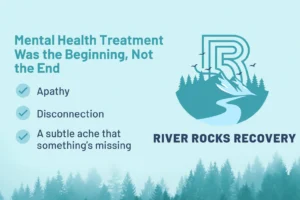You finished the program.
You showed up for your sessions.
You got through the hardest parts.
But lately? Something feels off. Not crisis-level. Not a total unraveling. Just… off.
If you’re months—or even years—out from completing mental health treatment, and you’re wondering why you’re still feeling flat, foggy, or disconnected, this is for you.
Because healing doesn’t end the day therapy does. And feeling stuck doesn’t mean you’re failing. It means something inside you is ready to grow again.
Mental Health Treatment Was the Beginning, Not the End
For a while, you felt better. Lighter. More stable. Maybe even hopeful. You built routines. Applied your tools. Avoided old patterns. You told people you were doing okay—and you weren’t lying.
But now you’re hitting something quieter. Harder to name.
- Apathy
- Disconnection
- A subtle ache that something’s missing
This phase is often misunderstood, even by those who’ve gone through it. But it’s incredibly common—especially for long-term alumni of mental health treatment programs.
You’re not broken. You’re evolving.
Disconnection Is a Signal, Not a Setback
Let’s name what this disconnection might feel like:
- You’re doing “the right things” but feel no joy
- Your old coping skills don’t feel effective anymore
- You’re emotionally flat—even in good moments
- You feel guilty for still struggling
What you’re experiencing isn’t relapse. It’s a signal. One that says:
You’ve healed enough to feel the emptiness underneath.
You’ve stabilized enough to notice what you’ve outgrown.
This isn’t failure. This is capacity.
At River Rocks Recovery in Middletown, Ohio, we work with alumni who’ve hit this stage. We help them understand that the “gray zone” they’re in is not a regression—it’s a call to deepen.
Why This Stage Feels So Strange
One of the hardest parts about long-term healing is that people around you assume you’re all better.
Even you may believe it.
But mental health isn’t a finish line. It’s a relationship.
You can do everything “right” and still feel emotionally stagnant because maintenance and growth are two different needs.
You don’t need crisis-level care anymore—but that doesn’t mean you don’t need care.
You may need something different than what you had in early treatment.
Maybe it’s deeper self-work. Maybe it’s reconnecting to meaning, identity, or community.
Whatever it is, the fact that you’re noticing it means you’re ready.

Life Keeps Moving—So Does Your Mental Health
Since treatment ended, life hasn’t stood still. It’s likely added more pressure, more complexity, more emotional weight.
Even with tools in hand, you’re not immune to:
- Loss
- Career shifts
- Relationship changes
- Family stress
- Grief that only shows up now that you’re stable
If you’re living in Monroe, Ohio or Hamilton, Ohio, you’re not far from mental health support that’s built for this exact chapter of your life—not the crisis that came before it. At River Rocks Recovery, we offer therapy and alumni care that adapts to where you are now, not just where you were when you started.
Because the truth is, you’ve grown. But you’re still human. And life will keep asking for more from you—emotionally, relationally, spiritually.
You’re allowed to come back to therapy without it meaning you “failed.” You’re allowed to say, I’m okay, but I think I could feel more alive than this.
The Shift from Stabilizing to Deepening
Early in mental health treatment, the focus is on stabilization: Stop the bleeding. Learn to breathe. Keep showing up.
But over time, that work becomes foundational—and your needs shift.
You may be ready for a deeper kind of healing. One that asks:
- What do I want to feel more of?
- What dreams or relationships have I been afraid to pursue?
- What emotional risks am I now strong enough to explore?
- Where am I hiding from my own growth?
This isn’t surface work. It’s identity work. Integration work.
It’s how recovery becomes more than just survival.
And it’s okay if that work needs a guide.
When to Reconnect With Mental Health Treatment
You don’t need to be in crisis to return to therapy. In fact, some of the most important work happens after things have calmed down.
Here are signs you might benefit from reconnecting:
- You feel emotionally disconnected, even when life is stable
- You’ve lost interest in things that used to matter
- You’re over-functioning to avoid feeling
- Your relationships feel distant or unsatisfying
- You’re craving growth, depth, or creative energy
- You’re asking: Is this all there is?
If even one of these feels familiar, it’s worth exploring.
You’ve done this before. But this time, it’s not about saving your life—it’s about making your life feel more fully yours.
FAQ: Re-Entering Therapy as a Long-Term Alumni
Is it normal to feel this way after treatment?
Yes. Many people hit an emotional plateau months or years after stabilizing. It doesn’t mean something’s wrong—it means something is ready for more attention.
Do I have to start over completely?
No. You’re not starting from scratch. You’re building on everything you already know. Therapy at this stage often feels different: less about crisis, more about meaning and expansion.
What if I feel guilty about needing help again?
That guilt is common—but unnecessary. Returning to therapy is a strength move. It says you’re paying attention to your emotional life and respecting it enough to grow.
Does River Rocks Recovery offer therapy for alumni?
Yes. We offer mental health treatment and continued care options tailored to long-term alumni. Whether you’re revisiting individual therapy, group work, or deeper trauma processing, we meet you where you are today.
You’re Still Healing—And That’s Okay
Let’s be clear:
You are not weak for still needing support.
You are not ungrateful for wanting more than stability.
You are not broken because healing takes longer than you thought.
You’re just human. A human who’s done incredible work—and who’s ready for the next chapter.
You don’t have to go back to the beginning. You just have to be willing to take one more step forward.
You don’t need a crisis to come back to care.
Call (888) 905-6281 to learn more about our mental health treatment services in Middletown, Ohio. We’re here when you’re ready—not because you failed, but because you’re still becoming.




























